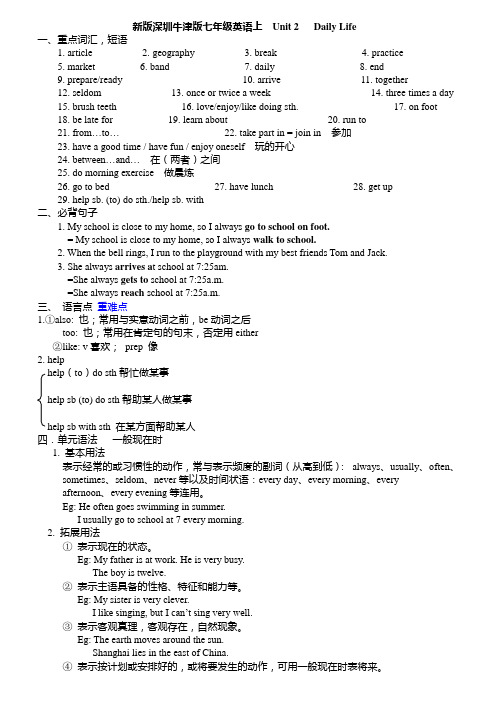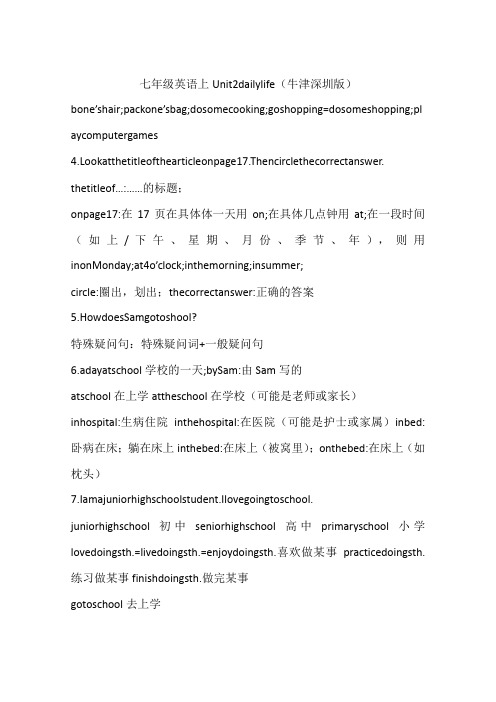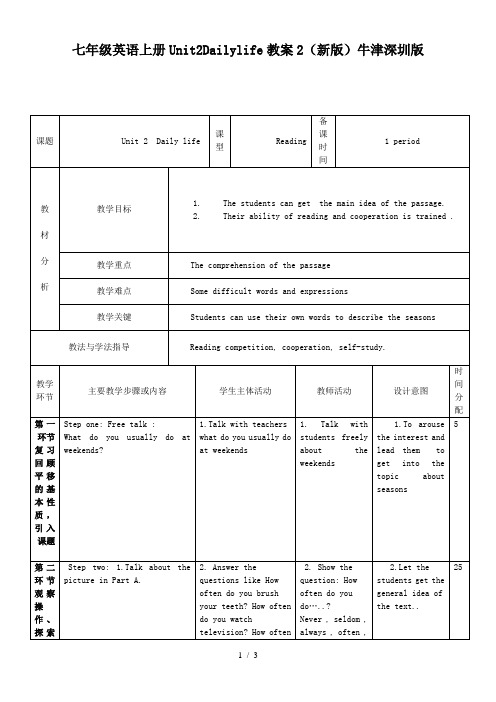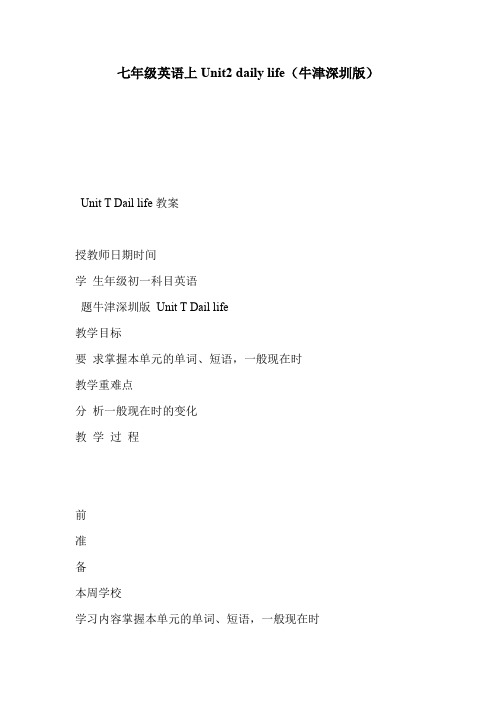牛津深圳版七年级英语上册Unit 2《Daily Life》(Grammar)公开课课件
牛津深圳版七上Unit 2Daily lif教材整合2

桃园中学英语学科整合学习教程(Unit 2----Part 2)一、词汇笔记:1.daily: adj.日常的=everyday; adv.每天=every day;daily是day+ly变形而来;例如:日常英语daily English = everyday EnglishI get at least 3 e-mails daily. = I get at least 3 e-mails every day.2. love: v.爱;n.爱;同根词汇lovely:adj.可爱的;lover:n.爱好者/爱人;love+n.喜欢某物如:I love basketball.love to do sth. 强调一次或偶然的喜欢love doing sth. 强调习惯性或经常性的喜欢fall in love with sb. 爱上某人She loves ________ the guitar very much. A. play B. playing C. plays3.seldom: adv.表示很少几乎不;seldom=hardly=rarely表示很少几乎不都是表示否定含义的副词,如:I seldom / hardly / rarely go to the cinema.He lives close to his office, so he _______ goes to work by bus.A. oftenB. seldomC. usually4.enjoy:v.喜欢享受enjoy doing sth = love doing sth = like doing sth喜欢做某事enjoy oneself = have fun = have a good time 玩得高兴Do you enjoy ________ ? A. go fish B. go fishing C. going fishing5.end: v.结束;n.最后部分末尾;同根词汇:ending:n.结尾结局;endless:adj.无止境的at the end of sth.在某物的尽头;in the end = at last = finally终于最后选词填空at the end of还是in the endWe had a meeting _______________ last month. He found his key _____________. 用end的同根词汇填空:Not every fairy tale has a happy _______________.6.practice:n.练习; 同根词汇:practise: v.练习practice doing sth: 练习做某事如:I practiced running yesterday.7.remember:v.记得;反义词forget:v.忘记,和remember用法类似remember to do sth.: 记得去做某事(指将要做的事,还没有做)remember doing sth.:记得做过某事(事情已经做过了);It’s raining heavily outside, please remember __________ the windows.A. closeB. to closeC. closing8.help:v.帮助; n.帮助;同根词汇:helpful: adj.有用的有益的;helpless: adj.无助的help sb. with sth.在某方面帮助某人I helped them with this job.help sb. to do sth. = help sb. do sth. 帮助某人做某事can’t help doing sth. 忍不住做某事help oneself to sth.随便用或吃某物;自便help sb. out帮助某人摆脱困境9.go to bed: = fall asleep:入睡表示瞬间动作;be asleep:睡着了表示延续动作选go to bed/ fall asleep还是be asleep填空IF you want to keep healthy, you should _____________ early and get up early. Look! The dog ________________.二、词汇变身:ually(形容词adj.): _______________2. daily(同义词): _______________3.ride(过去分词): _______________4. end(同义词): _______________5.practice(动词v.): _______________6. tooth(复数): _______________7.foot(复数): _______________ 8. class(反义词): _______________9.junior(反义词): _______________ 10.seldom(反义词): _______________三、词汇应用:1.break(v.); break(n.)①They always worked all day without a ____________ . How hard they were!②Do n’t ____________ my sunglasses.③He ____________ his leg when he rode a bike.2.ring(v.); ring(n.)①Students run out of the classroom as soon as the bell ____________.②I ____________you yesterday but you weren’t in.③There is a ____________ around his finger.3.practice(n.); practise(v.)①There is a football ____________ every weekend.②In this lesson, we will ____________ using some new words.4.end(v.); end(n.)①The lesson ____________ with an interesting story.②At the ____________ of the road, there is a red house.③They walked out of the forest in the ____________ .5.ride(v.); ride(n.)①George taught him how to ____________ a horse.②Would you like to go for a ____________ ?③The little boy ____________ on his father’s shoulders when I saw him.6.enjoy oneself; enjoy doing①----What should I do in my free time?----Get out and enjoy ____________ (your), make new friends.②I enjoy ____________ (go) to park and ____________ (fly) kites.7.play with sth./sb.①She likes to ____________ ____________ her little pets.②I don’t need you to ____________ ____________ ____________ (me)!----Yes. Please write it down on your notebook.8. different(adj.); difference(n.)①In the forest, we can find many ____________ kinds of plants.②There is no ____________ between the two pictures on the wall.四、用时间状语(at 8 a.m.; in the morning/afternoon/evening; from 11:50 a.m. to 12:30 a.m.; when the bell rings; after lunch; between 8 and 9 in the evening; later in the afternoon)和相关的动词(start/begin; end)来描述与日常生活:1.Tom每天在6:20a.m.起床。
新版深圳牛津版英语七年级上chapter2_Daily_Life

新版深圳牛津版七年级英语上Unit 2 Daily Life一、重点词汇,短语1. article2. geography3. break4. practice5. market6. band7. daily8. end9. prepare/ready 10. arrive 11. together12. seldom 13. once or twice a week 14. three times a day15. brush teeth 16. love/enjoy/like doing sth. 17. on foot18. be late for 19. learn about 20. run to21. from…to…22. take part in = join in 参加23. have a good time / have fun / enjoy oneself 玩的开心24. between…and…在(两者)之间25. do morning exercise 做晨炼26. go to bed 27. have lunch 28. get up29. help sb. (to) do sth./help sb. with二、必背句子1. My school is close to my home, so I always go to school on foot.= My school is close to my home, so I always walk to school.2. When the bell rings, I run to the playground with my best friends Tom and Jack.3. She always arrives a t school at 7:25am.=She always gets to school at 7:25a.m.=She always reach school at 7:25a.m.三、语言点重难点1.①also: 也;常用与实意动词之前,be动词之后too: 也;常用在肯定句的句末,否定用either②like: v喜欢;prep 像2. helphelp(to)do sth帮忙做某事help sb (to) do sth帮助某人做某事help sb with sth 在某方面帮助某人四.单元语法一般现在时1. 基本用法表示经常的或习惯性的动作,常与表示频度的副词(从高到低):always、usually、often、sometimes、seldom、never等以及时间状语:every day、every morning、everyafternoon、every evening等连用。
牛津深圳英语七年级上册unit2DailyLife

牛津深圳英语七年级上册unit2DailyLifeUnit 2 Daily life一、核心词汇daily ______________ article _____________ never________________ break n. ________ v.__________ usually____________ so____________ bell_____________ ring_____________ seldom_________________ ride_________________ guitar___________ band_____________ together____________ grade____________ Geography n._________________ market__________________ practice.n___________ v.___________二、重点短语junior high school ____________ senior high school ________________ primary school ________________ on foot ____________________take part in ________________ go to bed________________get up__________________have a good/great/wonderful time =enjoy oneself =have fun _________________________三、难点精讲1.辨析That’s right .All right与That’s all right①That’s right 对的,正确的。
(对别人所说的话表示肯定)②All right 好吧;身体康复了;令人满意的③That’s all right 不用谢;没关系(客气话和道歉的回应)运用:(1)----What’s four and six?---- It’s ten. ---- ____________.(2)----Let’s play football.--- ___________.(3) --- Thank you very much.---- ____________.2.Which of these things do you do once or twice a week?(page16)①助动词do/does/did后面要跟动词原形;②once or twice a week每周一两次注意:在英语中,表示一次用“once”,两次用“twice”,表示三次或者三次以上就用“基数词+times”(time在这里是可数名词,表示次数,需要加“s”)如:once a week,twice a week, three(four/ five…)times a week每月三次_____________ 每月一次_______________一年一次___________________3.how often do you watch television(page 23)①how often 多久一次,询问动作发生的频率(上节学过的特殊疑问句,现在再②watch televi sion= watch TV 看电视Look after“看”,强调动作的结果,但不一定是有意识地看See a movie /doctor 主要指看书、看报、看杂志Read newspaper1.____________ have you been in China?---For three years.2._____________will he back?---In five minutes.3.______________ do his parents let him watch TV?----- Three times a week.4.Classes start at 8 am, and I am seldom late.(page17)①start 在这里是不及物动词,开始。
七年级英语上Unit2dailylife(牛津深圳版)

七年级英语上Unit2dailylife(牛津深圳版)bone’shair;packone’sbag;dosomecooking;goshopping=dosomeshopping;pl aycomputergames4.Lookatthetitleofthearticleonpage17.Thencirclethecorrectanswer. thetitleof…:……的标题;onpage17:在17页在具体体一天用on;在具体几点钟用at;在一段时间(如上/下午、星期、月份、季节、年),则用inonMonday;at4o’clock;inthemorning;insummer;circle:圈出,划出;thecorrectanswer:正确的答案5.HowdoesSamgotoshool?特殊疑问句:特殊疑问词+一般疑问句6.adayatschool学校的一天;bySam:由Sam写的atschool在上学attheschool在学校(可能是老师或家长)inhospital:生病住院inthehospital:在医院(可能是护士或家属)inbed:卧病在床;躺在床上inthebed:在床上(被窝里);onthebed:在床上(如枕头)7.Iamajuniorhighschoolstudent.Ilovegoingtoschool.juniorhighschool初中seniorhighschool高中primaryschool小学lovedoingsth.=livedoingsth.=enjoydoingsth.喜欢做某事practicedoingsth.练习做某事finishdoingsth.做完某事gotoschool去上学8.Myschoolisclosetomyhome,soIalwaysgotoschoolonfoot.becloseto离……近=near=beside=notfarawayfromfamily的意思是“家庭、家庭成员”,与居住的房子无关。
牛津深圳新版 七年级上CHAPTER 2 DAILY LIFE

CHAPTER 2 DAILY LIFE【翻译下列短语】一周两次步行learn about从......到......参加玩得开心,过得愉快after-school activitiestalk about在......与......之间给某人送某物到达帮助某人做某事on the way to...work on...one of the best...喜欢做某事日常生活骑自行车弹钢琴睡觉【一般现在时】一. 意义:表示经常发生的事情,动作或存在的状态二. 构成及变化I like Chinese.He likes English.Lily likes singing.(1)一般现在时中的be动词:一般用原形:am is are(2)一般现在时中的动词:只有第三人称单数用动词三单,其余动词均用原形三单变化:多数在动词后加s play—plays like—likes 以s,x,sh,ch,o结尾的动词加es go—goes wash--washes12.He usually goes to school by bike._______ _________ _________ to school by bike? (改为一般疑问句)He ______ ________ ________ to school by bike. (改为否定句)一、单项选择题I选出可以替换划线部分的选项。
1.( )Ben seldom has breakfast in the morning.A.oftenuallyC.rarelyD.never2.( )I took part in the football club yesterday.A.attendedB.joinedC.leftD.eacaped3.( ) Did you have a good time at Lily’s birthday party.A.feel goodB.be happyC.enjoy yourselfD.smell good4.( )The meeting ends at 4:30 p.m.A.stopsB.opensC.startsD.begins5.( )Let’s go to the library together.A.with youB.with each otherC.every oneD.one anotherII.选出最符合题意的选项。
七年级英语上册Unit2Dailylife教案4(新版)牛津深圳版

堂
教
学
流
程
Prepare for listening→Listening→Speaking→summary
效
果
评
价
与
反
思
Where do you go to read books ,? When do you sing songs with your family when do you go to bed?
4. Fill in the blank in P24 , and talk with your partner about your friends’ life
To train the students’ ability of catching the information of the listening materials
3.To develop the students’ ability of listening and speaking.
4.To provide a chance for the partner to cooperate and create.
Between 8 and 9 , later in the afternoon
2. listen and fill in the blank of each pitures.
3. Talk about Jack’s weekend and learn to ask the questions like when do you read books in the morning , where do you go to buy food with your parents?
第二环节 观察操作、探索归纳平移的作法
七年级英语上册Unit2Dailylife教案2(新版)牛津深圳版

第三环节 课堂练习
Step five: exercise
6.Finish the exercise in Part C and D
6.Help them to find the detailsin the text.
6. To train the students’reading ability .
5
第四环节 课时小结
step Six: Sum up
7 Sum up
How to use the simple present tense to talk about the daily life
7.Show a PPT to sum up : master the important structure : How often do you do….?
7. Prepare for the writing
5
第五环节 课后作业
Homework
1. Read the text fluently
2 write a passage to talk about your daily life
Hand out a sheet which contain the request of writing the passage
1. Talk with students freely about the weekends
1.Toarouse the interest and lead them to get into the topic about seasons
5
第二环节 观察操作、探索归纳平移的作法
Step two:1.Talk about the picture in Part A.
七年级英语上Unit2 daily life(牛津深圳版)

七年级英语上Unit2 daily life(牛津深圳版)Unit T Dail life教案授教师日期时间学生年级初一科目英语题牛津深圳版Unit T Dail life教学目标要求掌握本单元的单词、短语,一般现在时教学重难点分析一般现在时的变化教学过程前准备本周学校学习内容掌握本单元的单词、短语,一般现在时存在和要解决的问题动词碰到第三人称单数时,要进行相应的变化一般现在时的功能一般现在时常用下列副词或副词短语作时间状语:一般现在时的构成知识要点概述Unit T Dail life Reading1 L at these pitures and anser the questins abut ur dail lifel at= have a l at 看一看; anser the questins= repl t the questins(repl t 更强调书面回答,较正式); dail life:日常生活2 hih f these things d u d ne r tie a ee?助动词d/des/did后面要跟动词原形;ne a ee, tie a ee, three(fur/ five…)ties a ee3 brush ne’s teeth刷牙; ath televisin= ath TV看电视; pla table tennis 打乒乓球;ride a bile骑单车; pla the pian弹钢琴; ash lthes= d se ashing洗衣服拓展:ash ne’s fae; b ne’s hair; pa ne’s bag; d se ing; g shpping= d se shpping; pla puter gaes4 L at the title f the artile n page 17 Then irle the rret anserthe title f…: ……的标题;n page 17:在17页在具体体一天用n; 在具体几点钟用at; 在一段时间(如上/下午、星期、月份、季节、年),则用in n nda; at 4 ’l; in the rning; in suer;irle:圈出,划出;the rret anser:正确的答案H des Sa g t shl?特殊疑问句:特殊疑问词+ 一般疑问句6 a da at shl 学校的一天; b Sa: 由Sa写的at shl 在上学at the shl在学校(可能是老师或家长)in hspital: 生病住院in the hspital: 在医院(可能是护士或家属)in bed: 卧病在床;躺在床上in the bed: 在床上(被窝里);n the bed: 在床上(如枕头)7 I a a unir high shl student I lve ging t shlunir high shl 初中senir high shl 高中priar shl 小学lve ding sth= live ding sth = en ding sth喜欢做某事pratie ding sth练习做某事finish ding sth 做完某事g t shl 去上学8 shl is lse t he, s I alas g t shl n ftbe lse t 离……近= near =beside= nt far aa frfail 的意思是“家庭、家庭成员”,与居住的房子无关。
- 1、下载文档前请自行甄别文档内容的完整性,平台不提供额外的编辑、内容补充、找答案等附加服务。
- 2、"仅部分预览"的文档,不可在线预览部分如存在完整性等问题,可反馈申请退款(可完整预览的文档不适用该条件!)。
- 3、如文档侵犯您的权益,请联系客服反馈,我们会尽快为您处理(人工客服工作时间:9:00-18:30)。
A1 Use the information in the article on Page 17 to complete the conversation below.
go Does Sam ______(go) S1: (1)_______ to school by bus? goes S2: No, he (2)________. to doesn't He (3)______(go) school on foot. Do play S1: (4)______ Sam and his friends _____(play) games during the morning break? S2: Yes, they (5)______. do S1: What (6)______ after school? does Sam _____(do) do takes S2: He (7)_______(take) part in the school band practice.
always
usually
100%
80-90%
总是 通常 经常 有时 从不
often sometimes
seldom
10-20% 不常,很少
We use adverbs and adverbial phrases of frequency to talk about how often things happen.
does
A2 In pairs, talk about the things in the box.
go to school by bus study Chinese, Maths and English in the morning take part in after-school activities
They discuss business with the clients every day.
一般现在时 句子结构
主语 + am/ is/ are (表示状态)
主语(I/We/You/They)+动词原形
主语(He/She/It)+动词(s)
一般现在时的 否定 和 疑问 主语 + be (am, are, is) not I/ We / You/ They + don’t +动词原形 She/ He/ It + doesn’t +动词原形
1. Sam经常参加学校的吉他训练。 takes part ______ in Sam often _____ ______ the school guitar practice. 2. -你平时是走路上学的吗?-是的。 go to school on foot? -_____ Do you usually _____ -Yes, I ______. do 3. -汤姆喜欢学习地理吗? -不,他不喜欢。他喜欢生物。 -_______ Does Tom _______ like Geography? -No, he doesn't _______. He ________ Biology. likes
一般现在时用于表示现在存在的事实、状 态或经常的、习惯性的动作
e.g. 1 现在存在的事实、状态。
太阳从东边升起。
The sun rises from the east.
月亮围绕地球转。
The moon goes around the earth.
e.g. 2 经常的、习惯性的动作 他们每天都和客人谈生意。
We use the simple present tense to talk about regular actions.
-es 1. In statements, we add -s or ______ to verbs after he/she/it.
2. In questions, we use _____ do before does before I/you/we/they and _________ he/she/it.
Work out the rule:
1. Adverbs of frequency come (before/after) the main verbs. 2. Adverbial phrases of frequency often come (in the middle/at the end) of a sentence. Sometimes they come at the beginning.
动词一般现在时第三人称单数变化规则
1. 一般的动词后面直接加-s.如:walk 2. 以-s,-x, -sh或-ch结尾的动词后加-es. 如:discuss discusses 3. 以辅音字母 + y 结尾的动词,变y 为i再加-es. 如:study studies walks
4. 特殊变化。如:do
I always/ usually/ often/sometimes/ seldom/ never go to school on foot.
I go to the English Club every day. twice a week. On Saturdays, Once a month, I go to the park.
Read the following sentences and tell the meanings. She plays basketball on Mondays and Thursdays.
They often discuss business at dinner.
一般现在时用于表示现在存在的事实、状 态或经常的、习惯性的动作
Be (Am, Are, Is) + 主语 Do+ I/ we/ you/ they +动词原形 Does+ she/ he/ it + 动词原形
I am a student in Junior One. Are --- _______ you a student in Junior One? --- Yes, I _______. / No, I _______. am am not
